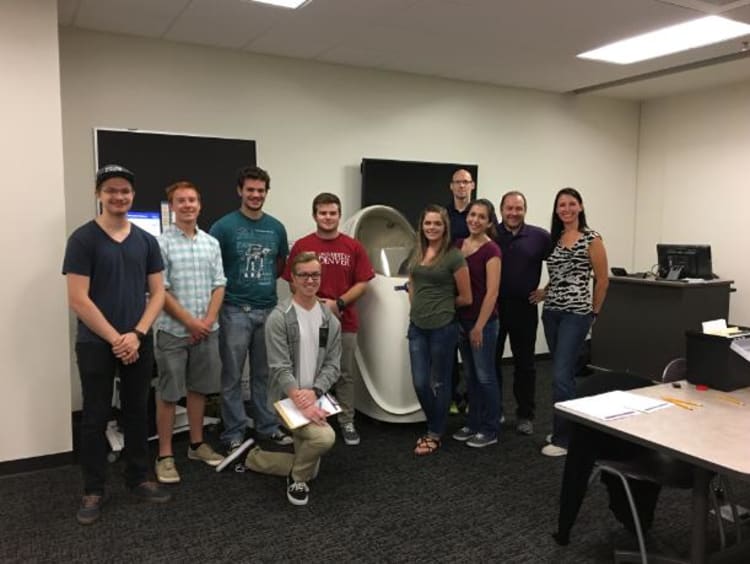Spotlight: GCU’s POWER Lab
By Brooklyn Harris
Biology Pre-Medicine Major, College of Science, Engineering and Technology

The College of Science, Engineering and Technology at Grand Canyon University places an emphasis on involving undergraduate students in research projects. One of the research projects is the POWER (Performance Optimization, Wellness and Exercise Research) Lab.
As a part of GCU POWER Lab, one particular research project was designed to determine if a relationship exists between sports performance measures, nutrition, health measures and injury rates in athletes. GCU research assistant students helped with recruitment and data collection. The data collection included a nutrition questionnaire which was designed to analyze both the athletes’ knowledge of nutrition and the application of their knowledge. A simple finger stick provided information on the athletes’ health such as their iron, cholesterol, sugar and protein levels. A device called a Bod Pod used air displacement plethysmography to determine body fat composition.
Collecting Data for the POWER Lab
Last year was our first year collecting data on this particular project, which consisted of a series of physical fitness tests early in the morning. The fitness tests were easier to schedule and administer due to the ability to test a whole team at once. The questionnaire, Bod Pod and health measures could only be administered to a few athletes at a time due to a longer and more complicated testing process.
Due to these challenges, along with a need to clarify a few other items of data collection, we needed to revise and resubmit our research plan for re-approval through the Institutional Review Board (IRB). Although the re-approval process delayed further data collection, the undergraduate student researchers were able to learn the process more thoroughly to help future projects avoid time delays.
The IRB helped us established necessary components to continue collecting data. Most universities collect sports performance data on their athletes before and after the seasons. This data includes physical tests similar to those that the athletes in our research were undergoing. By adding the ability to utilize existing information, we were able to overcome time restraints. There were also many other teams completing research and collecting similar data. In the new approval, we sought to collect data from other research groups within our department. This would make it easy to further expand our database with a limited amount of time and resources.
We are excited to continue our undergraduate student research as it provides a great opportunity for us to learn the research process. We are also looking forward to analyzing the collected data, preparing presentations and exploring potential publication opportunities.
At Grand Canyon University, we proudly offer research programs and student resources to help our students succeed. Learn more by visiting our website or contacting us using the Request More Information button.
More About Brooklyn:
Brooklyn Harris is a senior at Grand Canyon University majoring in biology with in emphasis in pre-medicine. She is from Stem, North Carolina and has always strived to explore the world as well as expand her growing love for medicine. Currently, Brooklyn works as a medical scribe in Abrazo Emergency Departments across the Valley as well as in Payson, Arizona. After graduating from Grand Canyon University, she will be pursuing her master’s degree in medical science before applying to medical school.
The views and opinions expressed in this article are those of the author’s and do not necessarily reflect the official policy or position of Grand Canyon University. Any sources cited were accurate as of the publish date.


